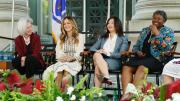“KnoW THAT LISTENING is your secret weapon,” award-winning actor and humanitarian Sarah Jessica Parker told imminent Harvard Law School (HLS) graduates and their families on Class Day.
The earnest speech was delivered before an international crowd of hundreds at Holmes Field. Listening, Parker said, “can be especially challenging for smart people who have so much to share. It requires an exhausting rigor and discipline, especially when faced with those whose opinions and ideology is anathema.” But it engenders empathy, she added, and shows “others the most formidable artillery is knowledge and respect.”
She acknowledged that change, although not necessarily “pleasant” or “easy,” “will always be the natural state of the world. Which is why the possibility of change, of transformation, is the central dilemma of the great philosophies, of the great religions, of art. And, of course, of the law.”
The speech capped a year of controversy and social change on campus. Last fall, the group Reclaim Harvard Law School demanded, among other things, that HLS establish a critical race theory program, hire a more diverse faculty, and abandon the controversial HLS shield, which included the crest of a slaveholding family whose fortune endowed Harvard’s first law professorship. In November, portraits of African-American law professors hanging in Wasserstein Hall were found defaced with strips of black tape. By mid February, in an effort to create a “safe space” for open discussions about race, class, social inequity, and other sensitive topics on campus, students from Reclaim Harvard Law School had occupied Haas Lounge at the Caspersen Student Center. (At press time they are still using the space, although the official “occupation” had ceased.) In March, the Harvard Corporation agreed to abandon the HLS shield, following the recommendation of a committee of HLS faculty, students, and alumni.
Parker also explained that she has known HLS dean of students Marcia Sells since they were girls growing up together in Cincinnati. The actor, who has been on the stage and screen since age 11, talked about her own childhood among seven siblings in a family that struggled financially. Her mother was a public-school teacher: “For the most part we had what we needed. But rarely the things we wanted.” She hoped members of the class of 2016 would consistently recognize “that ‘to want’ is a gift.” It wrought, in Parker, “A hunger, a focused ambition, and a work ethic that is a sort of point of operation and pride for me. In ‘wanting’ is energy, surprise, youth, and motion. In ‘not wanting’ is inertia.”
Best known for her role as Carrie Bradshaw in the former HBO series Sex and the City, Parker is also a businesswoman, producer, philanthropist, a UNICEF ambassador, and an advocate for arts education. She has served on the President’s Committee on the Arts and the Humanities, worked with The Turnaround Arts Initiative—a group that uses arts education as a tool to help turn around struggling schools—and aided former New York City mayor Michael Bloomberg, M.B.A. ’66, LL.D. ’14, with fundraising for public schools. Later this year she will return to HBO as the star in a new television series, Divorce.
Parker’s other “hopes” for the class: “maintain your individuality,” “wrangle your fears,” benefit from the “strength that can come from disappointment,” and “distinguish the bad rules from the good ones.” Lastly, corny or not, Parker admitted that she is a devotee of the Golden Rule—or tries to be. “I would much rather risk the accusation of being naïve,” she said, “than shield myself from the uncomfortable confidence of cynicism.”
Parker shared the dais with professor of law Jeannie C. Suk, recipient of the Albert M. Sacks-Paul A. Freund Award for Teaching Excellence, and Gabriela Follett, HLS program assistant in the Human Rights Program, who has been a strong supporter of the student movement on campus. She received the Suzanne L. Richardson Staff Appreciation Award.
In separate addresses, both Suk and Follett talked openly about campus activism, and the wider cultural and political problems it reflects. “This has been an important and telling year,” Suk said. “The perspectives on the world that dominate our public debates seem so intractably divided, on matters large and small. The state of discourse on important issues has had many of us in despair, wanting to throw up our hands and stay home.” Suk also referenced her own family story, of her birth under a military dictatorship in South Korea, and of emigrating to the United States with her parents in 1979, at the age of six. “But it’s crucial that we not stay away. You graduates have a lot of work in front of you. A lot of active listening and speaking. A lot of teaching. A lot of difficult conversations with people who disagree with you on what to do, about problems of utmost importance and urgency for our future.”









